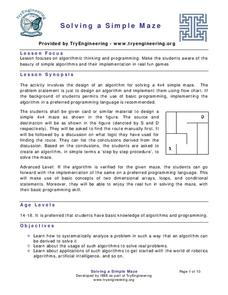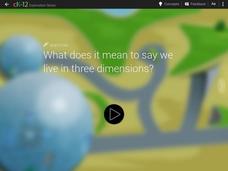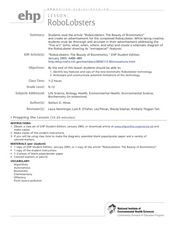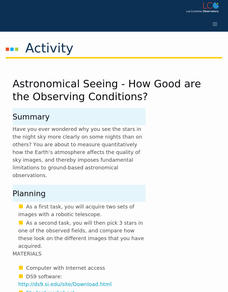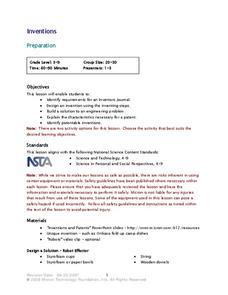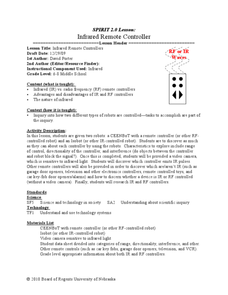Curated OER
Controlling Robots
Students create practical robotic devices with a laptop computer. They explore how to program LED lights and DC motors. They examine a wide range of motors, switches and relays.
NOAA
What Little Herc Saw
See the underwater world through a different pair of eyes! Middle school marine biologists identify deep-sea organisms by examining images taken by an ROV from the Okeanos Explorer. After determining what creatures lie beneath the...
TryEngineering
Solving a Simple Maze
Solve a maze ... from a robot's point of view. In the lesson, your scholars build a small, simple maze from cardboard and then find a route from the start point to the finish point. They write an algorithmic process that a robot could...
CK-12 Foundation
Irwin 2D
Learners explore two-dimensional motion through visual modeling with an interactive lesson that allows them to control the path of a robot. Graphs show both the horizontal and vertical motion as the robot continues through its entire route.
CK-12 Foundation
Irwin and Ruthie
Learners compare acceleration to displacement through an interactive tutorial that permits them to adjust the running strategy of two robots and watch them race. A graph displays the robot's velocity over time and another shows their...
Starfall
Robot and Mr. Mole
In this language arts learning exercise, students investigate the long /o/ sound by identifying pictures and writing its name.
Scholastic
Falling Stars
Young scientists explore meteors, and comets by reading a fascinating passage in the plan, then answering 13 questions about them. Then, learners perform a WebQuest and learn amazing things about gravity, robots, and black holes. The...
Curated OER
Robo-Lobster
Introduce environmental science or engineering explorers to different forms of sampling. They read an article about "Robo-lobsters," lobsters being studied to help design robots that can used to sniff out pollution in ocean waters. The...
Curated OER
Chapter 2: The Economizing Problem
It doesn't take a lecture on economics to convince teenagers that one's wants often exceed one's means, but this presentation will hopefully help them to understand the discrepancy. Using an example of pizza and robot arms, the slides...
Curated OER
Doubling and Halving
A cute square-headed robot is here to help your class understand doubling and halving. Numbers go in his head and come out his ear doubled. Those same number then go in his ear and come out his head halved. This is a great way to show...
Kiwi Crate
Story Cards
Inspire your class to tell some creative stories with a series of story cards. They arrange cards that feature pictures of various items (a robot, a jeep, a ladybug, etc.) and narrate a story about each item.
Scholastic
Drones Take Off
Ever wonder what drones are doing high above us in the sky? This article gives your class an insight to what those robots in the sky are doing. After reading an article on drone technology, pupils are prompted to respond to a variety of...
Charleston School District
Transformation Basics
Transformations are more than the process in which sports cars become fighting robots. Listed in terms of which transformations give congruent or similar figures, several resources provide definitions and examples of the four basic...
EngageNY
Why Are Vectors Useful? 1
How do vectors help make problem solving more efficient? Math scholars use vectors to represent different phenomenon and calculate resultant vectors to answer questions. Problems vary from modeling airplane motion to the path of a robot.
Las Cumbres Observatory
Astronomical Seeing - How Good Are the Observing Conditions?
Why is star gazing easy on some nights and difficult on others? Pupils aim to quantify the answer in an enlightening astronomy lesson. After collecting images from an online robotic telescope, they measure the brightness of images using...
Curated OER
Smallest and Largest Numbers
Incorporate robots into your lesson on number value! For the first worksheet, learners examine two pairs of robots with numbers (1-10) on their chests. They follow directions and color the robot with the largest or smallest number. Then,...
K12 Reader
The Pot is Hot
What do a pot and a robot have in common? They both end in -ot! Kids practice their -ot words by reading the short poem included here and then tap into reading comprehension skills by answering the three questions.
Curated OER
Inventions
Students study invention steps and design their own invention. In this invention lesson, students discuss inventions and the process of inventing. Studnets write in an inventor's journal and study various types of inventions. Students...
Curated OER
Kinetic Sculpture
Young scholars discover the art of kinetic sculpture using found materials to create objects with human characteristics. Activities address inventive thinking, utilizing unusual materials and team building through the creation of robotic...
American Museum of Natural History
A Closer Look at Mars
A website looks at how we know so much about Mars—telescopes, robots, and spacecraft—and the search for martian life. Following the informational text are three questions that quiz pupils about possible life on Mars.
Curated OER
Infrared Remote Controllers
Students differentiate the two types of remote controllers namely RF and IR. In this technology lesson, students test their properties using CEENBoT and Isobot. They present their findings in class.
Curated OER
Parts of Speech Lesson 2
In this grammar activity, students define nouns, verbs, and adjectives. Then they circle all of the verbs, put an X through all of the nouns, and underline all of the adjectives on the sheet.
Curated OER
Where's My Bot?
High schoolers estimate geographic position based on speed and air travel. In GPS lesson students use GPS to estimate the set and drift of currents.
Curated OER
Robot Cartography
Students identify points plotted on the coordinate plane. In this geometry lesson, students learn to read a map using concepts of a coordinate plane grid. They find the path given a map to tell them where to go.




